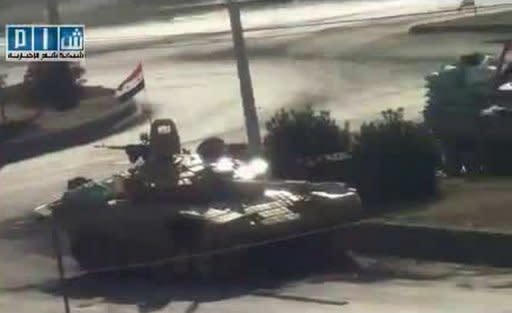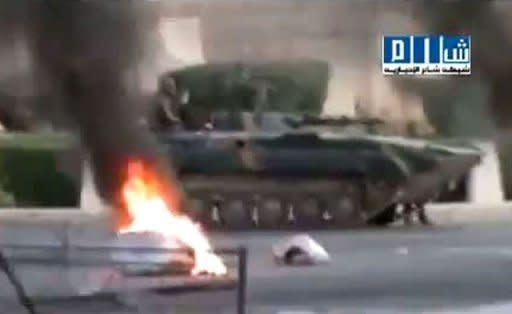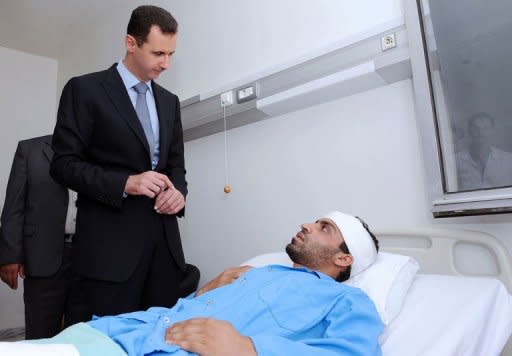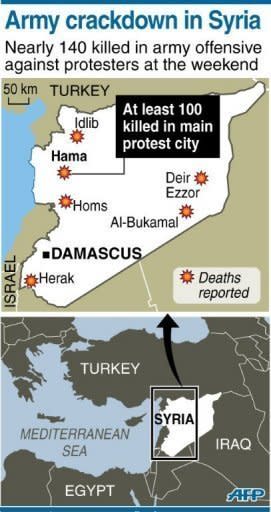Syrian tanks shell Hama ahead of UN meeting
Syrian tanks shelled the city of Hama on Monday after a day in which 100 people died, activists said, as President Bashar al-Assad praised his troops before a UN Security Council meeting. The Security Council members gathered for closed consultations on Monday, following demands from European powers to condemn Assad's deadly crackdown on opposition protests. Syrian forces on Sunday killed around 140 people across the country, including more than 100 in Hama, scene of an Islamist revolt in 1982 that was crushed at the cost of an estimated 20,000 lives. Rami Abdel Rahman, who heads the Syrian Observatory for Human Rights, called Sunday "one of the deadliest days" since the anti-regime protests broke out in mid-March, and said seven more people were killed on Monday in Syria. "Ten tanks are shelling Dawar Bilal indiscriminately," a activist told AFP in Nicosia by phone as the booms of explosions were heard in the background. He was referring to a residential area on the outskirts of Hama. The head of the Syrian League for the Defence of Human Rights, Abdel Karim Rihawi, told AFP that "intense shooting" was heard across Hama late Monday, the first night of the Muslim dawn-to-dusk fasting month of Ramadan. The official SANA news agency said troops were locked in clashes with "saboteurs" in the city. "The army is pursuing its mission in Hama and is removing barricades erected by groups of saboteurs at the entrances of the city," SANA said. Assad on Monday marked Army Day by showering his troops with praise even as international condemnation swelled ahead of the UN meeting on the crisis. The army had "proved its loyalty to its people, country and creed," Assad said. "Its efforts and sacrifices will be admired. These sacrifices succeeded in foiling the enemies of the country and ending sedition, preserving Syria." The embattled president also visited wounded soldiers in a Damascus hospital and said "all Syrians appreciate the army," SANA reported. More than 1,60O civilians and 369 members of the army and security forces have been killed since mid-March in Syria, according to the Observatory. Abdel Rahman said four more civilians were killed by security forces on Monday in Hama while a boy aged 13 and another person were shot dead in the eastern town of Al-Bukamal. Another civilian was shot in the head by security forces in Muadhamiya, in the Damascus region, and at least five were wounded on Monday, the Observatory said, a day after the army launched a military operation there. Abdel Rahman also reported that tanks rumbled Monday into Al-Bukamal, on the border with Iraq, two weeks after troops surrounded the town which official media said was used to smuggle in weapons and money. Reinforcements were also dispatched further north to Deir Ezzor, another rallying point of anti-regime protests where troops deployed on Saturday. "More than 80 tanks are heading there, in what appears to be the prelude to a vast military operation," said Abdel Rahman, quoting residents in Deir Ezzor, Syria's oil hub. Troops backed by tanks also stormed the town of Al-Hulla, northwest of Syria's third city Homs, where residents reported heavy gunfire and said 15 people were wounded and 18 arrested, according to the Observatory. Tanks were also closing in Zabadani and troops erected barricades to seal off the town northwest of Damascus, according to Rihawi. Syria's crackdown on dissent triggered a torrent of condemnation. Even traditional allies like Russia criticised Damascus and called for an immediate end to the violence. EU foreign policy chief Catherine Ashton confirmed that a new set of sanctions would be imposed from Tuesday on five Syrians "involved in or associated with the violence" and urged the UN to take a "clear stand." -- Military intervention "not a remote possibility" -- ------------------------------------------------------ Meanwhile British Foreign Secretary William Hague said there must be "international pressure" on Syria, "including from Arab nations" and from Turkey, in statements to BBC radio. But Hague stressed there was no prospect of achieving a UN mandate for military intervention such as in Libya. "It's not a remote possibility, even if we were in favour of that, which we're not." NATO chief Anders Fogh Rasmussen said the lack of a UN mandate and regional support meant the conditions were not met for a Libya-style operation. "In Libya, we're carrying out an operation based on a clear UN mandate. We have the support of countries in the region. These two conditions are not met in Syria," Rasmussen told a French daily. The UN Security Council opened its emergency meeting Monday amid concerns it could re-ignite bitter divisions within the Council, which has been unable to agree even on a statement on Assad's crackdown. "There is outrage over the new deaths, even Russia's foreign ministry has condemned it, but I am not sure it is going to be enough to change the council dynamics," said one diplomat, speaking on condition of anonymity. Britain, France, Germany, Portugal and the United States have pressed for weeks for condemnation of the violence but Russia and China -- angered by the NATO bombing campaign in Libya -- have threatened to veto any formal resolution against Assad. US Secretary of State Hillary Clinton asked the holdouts to reconsider. "We call on those members of the United Nations Security Council who have opposed any Security Council action that would call on Assad to stop the killing to reconsider their positions," Clinton said in a statement. "And we call on the international community to come together behind the people of Syria in this critical time," the chief US diplomat said. Moscow meanwhile urged Damascus on Monday to stop using force and repression against civilian protesters and Russian Deputy Foreign Minister Andrei Denisov spoke with Syrian Foreign Minister Walid Muallem, calling for dialogue to solve the crisis.





